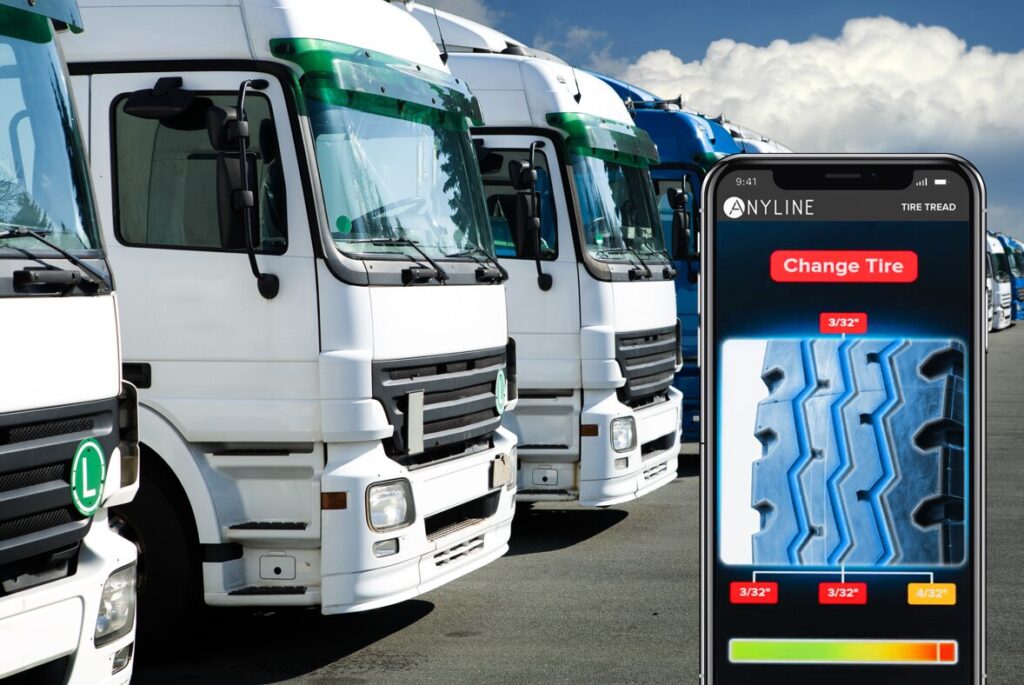Survey Unveils Urgency for Digital and AI Integration in Fleet Maintenance and Tire Management
Anyline study finds over 80% of fleets rely on outdated methods for upkeep, risking safety and thousands of dollars in monthly downtime costs
In a survey recently commissioned by Anyline, a global leader in mobile data capture and data insights, new light has been cast on the evolving landscape of fleet maintenance practices, with a focus on tire maintenance and management. Drawing responses from a wide array of US-based fleet managers and professionals, the findings spotlight the industry’s mixed approach to ensuring vehicle safety and operational efficiency. The results of the survey were announced at the Technology & Maintenance Council’s 2024 Annual Meeting & Transportation Technology Exhibition.
“The survey’s insights reveal a complex picture. On the one hand, the commitment to tire health and safety among fleet managers is commendable. On the other, the apparent lack of digital integration and the significant portion of fleets uncertain about their inspection routines highlight critical areas for immediate action,” said Lukas Kinigadner, CEO and founder at Anyline. “This is a wake-up call for the industry to leverage technology to not only close these gaps but also to enhance overall fleet efficiency and safety.”
The analysis not only exposes the industry’s disparate practices but also highlights the opportunity for innovative solutions to enhance fleet management. Key thematic findings include:
- Diligent Tire Inspections Gaps in Practice: While an impressive 70% of fleets conduct tire inspections at least weekly, showcasing a strong commitment to safety, a concerning 30% of respondents are uncertain about their inspection frequency or perform them only monthly or less often. This disparity underscores a significant area for improvement in regular maintenance checks.
- Subjective Tire Tread Inspection Methods: 82% of respondents use handheld tire gauges, which only measure one individual point on a tire and are error-prone while 48% rely on visual inspections, which are very subjective. More accurate tire tread measurement methods like drive over gauges, laser readers and tire tread depth scanning via mobile phones are used less than 10% of the time.
- Manual Delays Overshadow Digital Progress: 66% of fleets still rely on manual data logging, signaling a significant time sink in analog processes. Yet, a trend towards digital adoption is evident, with 54% working towards paperless processes in their operations. This movement underscores an urgent industry call to reduce inefficiencies and embrace digital efficiencies in fleet management.
- Varied Knowledge but Limited Digital Integration: Despite a majority considering themselves knowledgeable about tire health, the survey reveals a critical gap: only 18% integrate tread information into IT systems. With 52% manually entering data into systems, the industry’s slow adoption of digital solutions hampers efficiency and accuracy in maintenance practices.
- Digital Tools and Data Being Underutilized: The findings further highlight a possible reluctance to embrace technology, with a mere 15% capturing tire sidewall information digitally. This underutilization of available digital tools for maintenance records starkly contrasts with the acknowledged benefits of predictive maintenance and reduced downtime.
- Compliance and Inspection Methods Need Modernization: Although 74% adhere to performing required Driver Vehicle Inspection Reports (DVIR), the methods employed—39% still using paper checklists—indicate a lag in adopting more efficient, accurate digital processes.
“By delving into the intricacies of tire maintenance practices, Anyline aims to empower fleet managers with the knowledge and tools necessary to navigate the complexities of modern fleet management, ensuring safer, more efficient, and cost-effective operations,” concluded Kinigadner.
The survey, conducted by Babcox Research between February 1 and February 29, engaged ~200 fleet managers and professionals across various industries, providing a comprehensive view of current practices and attitudes towards fleet maintenance and tire management. The survey garnered participation from a diverse range of professionals within the fleet management industry.
The majority of respondents represented businesses in Contract/Common Carrier/General Freight (27%), with others hailing from various sectors (24%), and a smaller portion from Retail/Wholesale/Motor Vehicles/Drive/Tow (9%). The predominant job titles among participants were Owners, CEOs, and Presidents (27%), Fleet Managers (17%), and General/Operational Managers (15%), and Maintenance/Service Managers (15%). In terms of fleet size, responses were mostly from those managing small to medium fleets, with 21% having one to four vehicles, 18% overseeing 10 to 24 vehicles, and 16% with five to nine vehicles. Class 8 vehicles emerged as the most common type among respondents’ fleets, accounting for 61% of the reported vehicles, indicating a significant focus on heavy-duty trucking within the surveyed group. The diverse participation underscores the wide-ranging interest and concern across industries and job titles regarding the efficiency and safety of tire maintenance and management in fleet operations.
Category: Cab, Trailer & Body, Connected Fleet News, Driver Stuff, Engines & Drivetrains, Equipment, Featured, Fleet Diagnostics & Software, Fleet Maintenance, General Update, News, Products, Safety, Shop Stuff, Tech Talk, Tools, Vehicles











